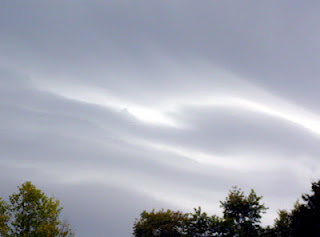These are my thoughts at the moment. Memories, all that stuff pushing its way up from the dark somewhere. In my mind's eye it comes from deep in my guts while neuroscience tries to tell me about synapses and grey matter.
There are these little insignificant flowers in the forest, almost gone now with the cold nights that have started to creep in. My first Latin lesson at age five. My grandfather in his three-piece suit complete with watch on a chain and a freshly ironed handkerchief - you get the picture - pointing his walking stick at this tiny pod and snap!! it would open and scatter its minute seeds. Noli me tangere, he said and I would whisper this like a magic mantra for the rest of the walk and have done since whenever I see it and stop to watch a pod snap open at my slightest touch. Quite the party trick.
My grandparents, my mother's parents, used to visit at least once a year when I was small. There was a style of long ago to their train journeys with seat reservations by the window and small sandwiches in a hamper with a silver flask, the collapsible fruit knife and the small napkins with ship motifs.
In the mornings we would fight outside the guest bedroom over who could climb into bed with him. Once there, cuddling up to his small bony frame, he would show me tricks, bending fingers just so, elaborate games turning intertwined thumbs and teaching me phrases in Arabic and French and Russian and Latin. While he got ready to shave and dress we fought over his travel slippers, made from very soft black leather which fitted just so into a matching soft leather bag.
This is what I know now. My grandfather was a scientist. There was a time when he was a famous scientist. I have a box of photographs from the 1920s of men in old fashioned safari suits and stiff explorer hats in front of mounds of rocks or staring down cliffs and ravines, holding up plants and a variety of dead lizards. There is one very shaky picture of a deck of a ship covered in millions of grasshoppers and one of a group of about twenty deeply tanned men in dinner jackets standing around a poor looking Xmas tree decorated with a banner "Borneo 1929".
I also know this. My mother adored him. My mother who was raised by nannies and house maids, who was driven to school by her father's chauffeur. I have been told that my grandfather published seminal works in his area of research, although I cannot find a single one. I have been told he was dined by kings and queens and dictators and mass murderers.
After the war, my grandparents lived in a tiny attic flat, stuffed with monstrous dark furniture from much grander times. They were quite helpless without maids or driver. The only room with decent ceiling space was used as my grandfather's study where I would hide below his desk, while he worked, puffing away on his small cigars, carefully writing elaborate notes with a sharp pencil in a silver holder.
So let's get this: Here he was, the famous scientist, the professor who - so I have been told - could electrify a crowded lecture hall with his quiet voice. Here, in a tiny flat. Very few visitors. A meagre pension. While others rebuilt their fortunes, brushed up their standing, rose back to fame, honorary doctorates, senior experts, laureates.
He was a gentle smiling grandfather, patient and exciting to us with his stories of exotic locations and his deep knowledge of nature. He was never denazified. I have no idea whether this is so because he opted not to apply for it or whether he failed it. Of course, not a word. Not ever.


